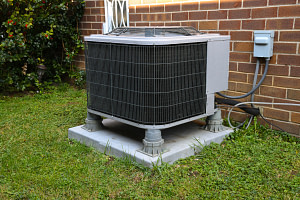Until the early 1900’s, the only way to cool a house was to open a window or have it constructed with catching a breeze in mind. Although the technology that served as the foundation for air conditioning was invented in 1902, it was not until the 1920’s that it was introduced for residential use. After that, home comfort was changed forever. Soon, companies that specialized in heating, ventilation, and air conditioning (HVAC) were installing and servicing home cooling systems across the country.
5 Main Benefits of Air Conditioning
- Livable Environment
Air conditioning allowed people to live in hot desert regions of the country in comfort for the first time. Areas like Phoenix and Tucson suddenly flourished as new residents moved in to take advantage of the warm, sunny climate, knowing their homes could be maintained at a comfortable level regardless of the exterior temperature; many residents of Michiana feel the same way. - Health Benefits of Air Conditioning
Hot, unfiltered air can exacerbate respiratory problems, allergies, heat-induced stress, sinus problems, and limited mobility. People who suffer from these conditions find filtered cold air alleviates their discomfort and allergy symptoms. Excessive heat can be harmful. In extreme instances, people may suffer heat exhaustion or heat stroke. For people with heart problems or other serious medical conditions, a cool environment might be essential. - Air Conditioning Reduces Humidity
Humidity, which is the amount of water in the air, can cause as much discomfort as high temperatures. Excessive humidity causes us to sweat, and because the air is supersaturated with moisture, sweat doesn’t evaporate. Evaporation is one of the body’s most important mechanisms for maintaining thermal equilibrium. When it’s inhibited, we’re left with sticky wet clothes, bad tempers, and lethargy. Air conditioning works by removing the water from the air and depositing it outside, leaving only dry, cool air to flow into the building interior. You could say an air conditioner does your sweating for you! - Fewer Insects and Parasites
Air conditioning filters keep out insects and are far more effective than a screen in an open window. Insects are annoying, but they can also be dangerous to people with allergies. One of the additional benefits of a good air conditioning system is that it will help keep indoor pets free of fleas and ticks. - Improved Workforce Efficiency
We’ve all experienced the mental sluggishness that comes with a day that is just too hot. There’s a scientific basis for this. According to an article in Scientific American, the energy the body expends trying to cool itself down takes away from our ability to think and reason. When offices are air-conditioned, people can work better and make better decisions.
There are even more benefits of air conditioning, such as:
- Easier sleep
- Protects furniture
- Prevents electronic devices from overheating
- Better security
- Fewer sweat stains
- and more!
Signs of Heat Exhaustion
Warning! Excessive heat or cold causes the body to spend energy to maintain a proper internal temperature. Without air conditioning to control air temperature and humidity in your living or workspace, humans use more energy, which might cause them to feel lethargic.
Steps to Relieve Heat Exhaustion
In most cases, you can treat heat exhaustion yourself by doing the following:
- Rest in a cool place. Getting into an air-conditioned building is best, but at the very least, find a shady spot or sit in front of a fan.
- Drink cool fluids. Stick to water or sports drinks.
- Try cooling measures like putting ice on pressure points and the neck and loosening clothing.
Recovery time for heat exhaustion is variable, but the worst of it must be observed to improve rapidly so as to avoid deadly heat stroke. If fluids and rest do not resolve symptoms, a doctor will perform a blood workup and other clinical tests to rule out other potential causes. If heat exhaustion is treated promptly, the individual will fully recover within 24-48 hours.


